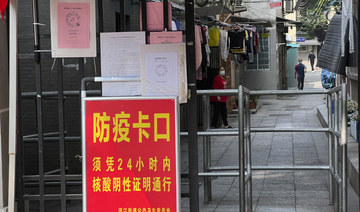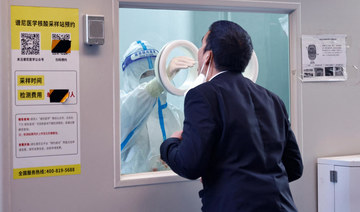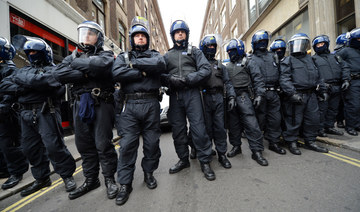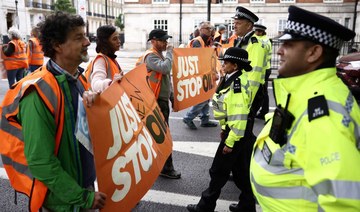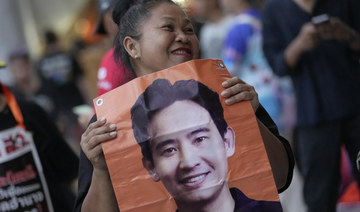BEIJING: Facing a surge in COVID-19 cases, China is setting up more intensive care facilities and trying to strengthen hospitals as Beijing rolls back anti-virus controls that confined millions of people to their homes, crushed economic growth and set off protests.
President Xi Jinping’s government is officially committed to stopping virus transmission, the last major country to try. But the latest moves suggest the ruling Communist Party will tolerate more cases without quarantines or shutting down travel or businesses as it winds down its “zero-COVID” strategy.
A Cabinet meeting called Thursday for “full mobilization” of hospitals including adding staff to ensure their “combat effectiveness” and increasing drug supplies, according to state media. Officials were told to keep track of the health of everyone in their area aged 65 and older.
It isn’t clear how much infection numbers have increased since Beijing last week ended mandatory testing as often as once a day in many areas. But interviews and social media accounts say there are outbreaks in businesses and schools across the country. Some restaurants and other businesses have closed because too many employees are sick.
The virus testing site in Beijing’s Runfeng Shuishang neighborhood shut down because all its employees were infected, the neighborhood government said Saturday on its social media account. “Please be patient,” it said.
Official case numbers are falling, but those no longer cover large parts of the population after mandatory testing ended Wednesday in many areas. That was part of dramatic changes that confirmed Beijing was trying gradually to join the United States and other governments that ended travel and other restrictions and are trying to live with the virus.
On Sunday, the government reported 10,815 new cases, including 8,477 without symptoms. That was basely one-quarter of the previous week’s daily peak above 40,000 but only represents people who are tested after being admitted to hospitals or for jobs in schools and other higher-risk sites.
Shaanxi province in the west has set aside 22,000 hospital beds for COVID-19 and is ready to increase its intensive care capacity 20 percent by converting other beds, the Shanghai news outlet The Paper reported, citing Yun Chunfu, an official of the provincial health commission. Yun said cities are “accelerating the upgrading” of hospitals for “critically ill patients.”
“Each city is required to designate a hospital with strong comprehensive strength and high treatment level” for COVID-19 cases, Yu was cited as saying at a news conference.
China has 138,000 intensive care beds, the general director of Bureau of Medical Administration of the National Health Commission, Jiao Yahui, said at a news conference Friday. That is less than one for every 10,000 people.
Health resources are distributed unevenly. Hospital beds are concentrated in Beijing, Shanghai and other cities on the prosperous east coast. Thursday’s Cabinet statement told officials to make sure rural areas have “fair access” to treatment and drugs.
China’s controls kept its infection rate low but crushed already weak economic growth and prompted complaints about the rising human cost. The official death toll is 5,235, compared with 1.1 million for the United States.
China’s official total case count of 363,072 is up nearly 50 percent from the Oct. 1 level after a rash of outbreaks across the country.
Still, health experts and economists say “zero COVID” is likely to stay in place at least through mid-2023 because millions of elderly people need to be vaccinated before restrictions that keep most visitors out of China be lifted. The government launched a campaign last week to vaccinate the elderly, a process that might take months.
Experts warn there still is a chance the ruling party might reverse course and reimpose restrictions if it worries hospitals might be overwhelmed.
Meanwhile, experts cited by state media called on the public to reduce the strain on hospitals by treating mild COVID-19 cases at home and putting off treatment for less serious problems.
Patients are standing in line for up to six hours to get into fever clinics. Accounts on social media say some hospitals turn away patients with problems deemed not serious enough to need urgent treatment.
Facing COVID-19 surge, China expanding hospitals, ICUs
https://arab.news/25q5q
Facing COVID-19 surge, China expanding hospitals, ICUs
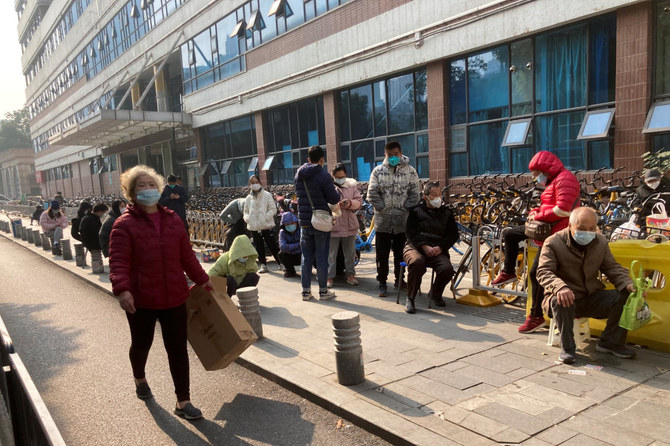
- Health experts and economists say ‘zero COVID’ is likely to stay in place at least through mid-2023
- Experts warn there still is a chance the ruling party might reverse course and reimpose restrictions
1 dead, others injured after London-Singapore flight hit severe turbulence, Singapore Airlines says

- The airline said the aircraft was a Boeing 777-300ER with a total of 211 passengers and 18 crew on board
Singapore’s Flight SQ321 from Heathrow was diverted to Bangkok and landed at 3:45 p.m. local time at Suvarnabhumi Airport, the airline announced in its Facebook page. The airline said the aircraft was a Boeing 777-300ER with a total of 211 passengers and 18 crew on board.
Local emergency crews from Samitivej Srinakarin Hospital were on site to transfer injured people off the runway for treatment. Videos posted on the LINE messaging platform by Suvarnabhumi Airport showed a line of ambulances streaming to the scene.
Injuries, 1 death after 'severe turbulence' on flight from London: Singapore Airlines

"We can confirm that there are injuries and one fatality on board the Boeing 777-300ER. There were a total of 211 passengers and 18 crew on board," the airline said on Facebook.
Britain’s new protest laws unlawful, London court rules in rights group’s challenge

- Civil rights group Liberty took the government to court over changes to public order laws made last year
- Judge rules new regulations gave the police almost unlimited powers to shut down protests
LONDON: Britain unlawfully gave police wider powers to impose conditions on peaceful protests which cause “more than minor” disruption to the public, London’s High Court ruled on Tuesday.
Civil rights group Liberty took the government to court over changes to public order laws made last year, which it says gave the police almost unlimited powers to shut down protests.
The case was heard in February amid a wider crackdown on protest movements in Britain and across Europe, as environmental activists have used direct action protests to demand urgent government action against climate change.
Judges David Bean and Timothy Kerr ruled in the group’s favor on Tuesday, finding that the regulations granting the new powers were unlawful.
The High Court granted the government permission to appeal and suspended its decision that the new powers should be quashed pending the outcome of the appeal.
Liberty’s legal action focused on the Public Order Act, under which the police can impose conditions on a protest if it could cause “serious disruption to the life of the community.”
The law was amended last year, so police could impose conditions in cases where a protest could cause “more than minor” disruption, which Liberty said was unlawful.
Government lawyers argued that ministers were given express powers to amend the law on what amounted to serious disruption.
But the High Court ruled that the government exceeded its powers, which “did not extend to lowering the threshold for police intervention.”
Thai minister quits over legal complaint seeking PM’s dismissal

- Pichit Chuenban says his resignation would allow the country ‘to move ahead and not impact the administrative work of the prime minister that needs continuity’
BANGKOK: A Thai minister at the center of a pending legal complaint seeking the dismissal of Prime Minister Srettha Thavisin resigned on Tuesday, in an effort to insulate the premier from possible repercussions.
A group of 40 senators lodged a complaint to the Constitutional Court last week against Pichit Chuenban, 65, saying his appointment last month as minister to the prime minister’s office breached the constitution, as he has a criminal record.
The court was due on Thursday to decide whether or not to accept the case, which could lead to Srettha’s suspension.
“Even though I have been vetted and honestly believe that I am qualified by law, this matter is linked to the prime minister,” Pichit said in his resignation letter, shared with media by Srettha’s office.
He said his resignation would allow the country “to move ahead and not impact the administrative work of the prime minister that needs continuity.”
It was not immediately clear whether the resignation would have any impact on the complaint submitted to the court.
Pichit was jailed for six months in 2008 for contempt of court after an alleged attempt to bribe court officials with 2 million baht ($55,000) hidden in a paper grocery bag.
His law license was suspended for five years by the Lawyers Council of Thailand after the incident. The government has said it carefully vetted Pichit’s qualifications and was confident it could defend his appointment before the court.
Pichit becomes the third minister to quit Srettha’s cabinet, after his foreign minister and deputy finance minister resigned following a cabinet reshuffle last month.
The senators, whose term has ended, are currently lawmakers in a caretaker capacity pending the selection of a new chamber. They have accused Pichit of lacking integrity and ethical standards to hold a ministerial post.
Government critics say Pichit was appointed due to his close relationship with a client, ex-premier Thaksin Shinawatra, who returned to Thailand last year after 15 years in exile. Thaksin, an ally of Srettha, still wields considerable political influence, despite officially being retired.
The government has insisted Pichit was appointed due to his capabilities.
Arab Americans reject Biden, Trump reelection: Survey

- President gets 7%, predecessor 2% support because of Gaza ‘genocide’
- Much higher backing for third-party candidates Jill Stein, Cornell West
CHICAGO: A national survey of Arab Americans released on Monday shows that most respondents overwhelmingly reject the reelection of both President Joe Biden and his predecessor Donald Trump.
Conducted by the Arab American Anti-Discrimination Committee and the Truth Project on May 17 and 18, the survey shows support for Biden at 7 percent and Trump at 2 percent.
Arab and Muslim voters played a significant role in helping Biden defeat Trump in several key swing states in the November 2020 presidential election.
After taking office in January 2021, Biden responded by unveiling “A Plan for Partnership” with the Arab-American community that was to help strengthen ties with his administration.
But Biden’s unequivocal backing of Israel, including helping to approve more than $40 billion in military aid for the country’s alleged genocide in Gaza — which has taken more than 35,000 Palestinian lives — has all but erased that support and his edge over Trump in key swing states, according to the survey organizers.
“Since the start of the genocide many have speculated about who Arab Americans would vote for — Biden or Trump. The answer is neither, with third-party candidates getting substantial support,” ADC National Executive Director Abed Ayoub said in a statement to Arab News.
Third-party candidates Dr. Jill Stein and Dr. Cornell West received much higher support among Arab Americans.
Stein, who is Jewish and with the Green Party, received 25 percent support while West, who is African American, received 20 percent.
Not mentioned in the survey was leading third-party candidate Robert F. Kennedy Jr. His views have varied from calling for peace and recognition of Palestine to rejecting accusations that Israel’s actions in Gaza constitute genocide. Kennedy has declined repeated requests from Arab News for interviews.
Five national polls released in March and April from Quinnipiac University, Fox News, Marquette Law School, NBC News and Marist College showed Kennedy with 13 percent support for his independent presidential bid. Stein and West received only 3 percent each in the national polls.
As the presidential election approaches, “it is evident that Arab-American and allied voters are supporting candidates that are listening to our concerns and demands,” ADC said.
In its survey, 19 percent of Arab Americans said they were “undecided” and 3 percent said they would not vote in November.
ADC said support for Stein and West is based on the two running on an anti-genocide platform.
Stein has been a “strong and vocal supporter of Palestine” throughout her career, ADC noted, adding that West has also adopted this stance.
Arab, Muslim and other voters have shown significant opposition to Biden’s reelection in more than 30 state primaries, including five key swing states where he won by slim margins over Trump.
The primary election campaigns have been led by the #AbandonBiden movement, which told Arab News that it is considering hosting its own “Presidential Convention” in the autumn to galvanize Arab, Muslim and “progressive” voters to consider alternatives to Biden.
The ADC / Truth Project survey is based on outreach to 36,139 Arab Americans and “allied voters” who were asked one question: “Who are you voting for in November?”
Over the two days, 2,196 (6 percent) responded. ADC said this was “a high level of enthusiasm” in the presidential election race.
The Truth Project is a social welfare body committed to uniting a diverse coalition of Americans and organizations who support justice and equality in Palestine.
ADC has a large national grassroots membership base, and was founded in the 1980s to fight for civil and Arab-American rights.



